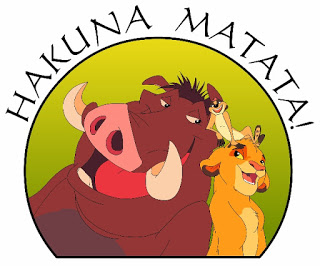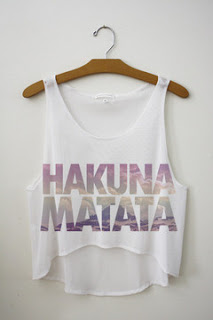 |
| Photo Credit: Flickr |
“Hakuna Matata! It means no worries…”
I’m sure everyone can finish that sentence–especially those who, like me, grew up on The Lion King and other Disney movies.
Except, did you know “hakuna matata” actually does mean “no worries” in Ki-Swahili? Maybe I’m the odd one out, but I didn’t!
Hakuna, “there are no,” matata, “problems” (or worries, colloquially).
Incidentally, Simba, our favorite main character’s name, means “lion,” Rafiki, our favorite supporting monkey, means “friend,” and Nala means “gift.” The list actually goes on and on, fatally crushing my (totally baseless) childhood assumption that Disney had made it all up. That I can recall, no credit was given. Classic.
What I find really fascinating is the way the phrase “Hakuna Matata” has come to define tourism along the Swahili Coast in many ways.
The following are my observations and hypotheses only, and in no way represent a comprehensive study or survey of tourism in the region. With that caveat in mind, I think we have some good old-fashioned Orientalism at play here.
Very briefly put, “Orientalism” describes a process (first laid out by Edward Said in his 1978 book by the same name) by which Western, largely fictional accounts of an exotic, Eastern “Other” serve to reinforce existing cultural stereotypes. This “knowledge” is then internalized by those “Others” when they observe themselves through Western lenses and reflected back to Western observers as reality. The original sense of Orientalism was limited to academia and a particular corner of the globe; however, the concept can have far-reaching applications.
When it comes to the phrase “Hakuna Matata,” Disney’s The Lion King effectively fed generations of Americans (and others) a heavily fictionalized and distorted portrait of Swahili culture without our realizing it.
Now, in the parts of Tanzania and Kenya I have visited, it’s a catchphrase for rastas on the beach, shopkeepers, souvenirs (T-shirts, pottery, paintings, postcards, keychains, sarongs, and every form of kitsch) and tourism.
 |
| Photo Credit: The Hunt |
It has managed to insinuate itself into the most mundane of daily interactions between tourists and locals: “Hi, how are you?” “I’m fine.” “Everything good? Hakuna Matata?” Or: “Coconut oil? Bracelet? Sister, you want something?” “No, thank you brother, I’m okay.” “Okay. Hakuna matata.”
And even in intrusive non-interactions: “Wei (You)! Where are you going? Just walking? Very good, Hakuna Matata.” Or muttered, half-interactions: “Helloooo.” “Hi.” “Jambooo. Helooo. Hakuna Matata…”
I don’t know what role those words played pre-Lion King and multi-million dollar tourism industry, but I doubt they were quite so widespread. Now, for the tourist world and the people that cater to it, those words are everything. I’ve started thinking of this as the “Hakuna Matata Complex,” though perhaps that’s undeserved.
My point is, whatever the initial impetus (did tourists’ expectations start the trend? did an enterprising salesman realize the opportunity for profit? I don’t know.), Hakuna Matata has become more than a catchy phrase to print on souvenirs.
It’s an identity and a brand. The East African coast seems to be turning into a caricature of itself—or, at least the face it presents to tourists is:
The carefree, “no worries” attitudes of the young men who roam the beach offering boat rides, bracelets and (sometimes) romantic flings. The escapist, happy-go-lucky language covering hotel brochures and tourism websites. The one-dimensional, highly stereotypical idea of a culture that is packaged, sold and summed up in two words: Hakuna Matata.
Most interesting are the many manners in which our favorite Swahili-turned-Disney slogan is used. Sometimes there is irony, and a look that I interpret as, “I am making a lot of money off your daft willingness to believe my culture boils down to two silly words, so I’ll follow the script.” Sometimes I read eagerness and sincerity: “Welcome to the land of Hakuna Matata. Really.” And sometimes I perceive something like resentment, which, considering the veritable flood of foreigners, would be understandable.
Sometimes, when I’ve heard “Hakuna Matata” for the thirtieth time that day, I want to tear someone’s Hakuna Matata T-shirt to shreds. I don’t. I just file it away in the Hakuna Matata compartment in my brain and keep walking… at some point, I will open that box and sort out what I’ve collected there. (This is a first attempt.)
I wonder: How many tourists go home thinking, “This is East Africa”?
I don’t know.
How many of the young men on the beach present this idea of themselves with sincerity, and genuinely identify with the Hakuna Matata Africa of brochures and T-shirts?
I don’t know. If they do, though, then these old and tired cultural stereotypes have triumphed, and indeed a limiting caricature has been made reality.
Or. Or maybe the joke is on us. Maybe there is more self-awareness and agency than I can observe from my position as an outsider. Maybe it’s not tourist demand driving Hakuna Matata supply, but a cheeky, ironic or simply pragmatic internal effort to determine how and by whose terms outsiders may experience Swahili culture.
I draw no conclusions as of yet, and only offer my working theories as food for thought. If anyone has been to this region and has a different perspective to share, I would love to hear it.
One thing is certain: It’s a wonderful phrase!